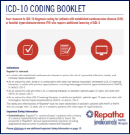INDICATIONS
Repatha® is indicated:
- To reduce the risk of major adverse cardiovascular (CV) events (CV death, myocardial infarction, stroke, unstable angina requiring ...
Repatha® is indicated:

This comprehensive resource helps equip your patients with information for their Repatha® treatment, including information on preparation, an LDL-C Tracker, and financial support information for patients’.

Learn more about how Amgen SupportPlus can help your patients access their prescribed medication.
Send your patients a direct link to enroll in the services provided by Amgen SupportPlus

Your eligible commercially insured patients may pay as little as $25 for a 1-month supply or $50 for a 3-month supply* with the Repatha® (evolocumab) Co-pay Card.
*Eligibility criteria and program maximums apply. Co-pay support for a 3-month supply depends on the patient's insurance, as some plans may impose quantity or dispensing limitations. Please see full Terms and Conditions at https://www.repatha.com/copaytcs.

Review the Instructions for Use and following resources:

This resource provides an informational guide to example ICD-10 codes frequently applicable to appropriate patients for Repatha®.
*Sample diagnosis codes are informational and not intended to be directive or a guarantee of reimbursement and include potential codes that would include FDA-approved indications for Repatha®. Other codes may be more appropriate given internal system guidelines, payer requirements, practice patterns, and the services rendered. It is the duty of the provider to understand individual patient considerations and use their own judgment and clinical decision making when determining a particular patient’s diagnosis and treatment.
These third party links are being provided as a convenience and for informational purposes only; they do not constitute an endorsement or an approval by Amgen of any of the products, services, or opinions of the organization or individual. Amgen bears no responsibility for the accuracy, legality, or content of the external site or for that of subsequent links.